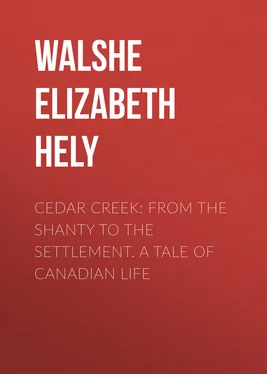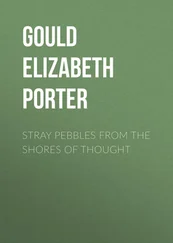Elizabeth Walshe - Cedar Creek - From the Shanty to the Settlement. A Tale of Canadian Life
Здесь есть возможность читать онлайн «Elizabeth Walshe - Cedar Creek - From the Shanty to the Settlement. A Tale of Canadian Life» — ознакомительный отрывок электронной книги совершенно бесплатно, а после прочтения отрывка купить полную версию. В некоторых случаях можно слушать аудио, скачать через торрент в формате fb2 и присутствует краткое содержание. Жанр: foreign_children, foreign_antique, foreign_prose, на английском языке. Описание произведения, (предисловие) а так же отзывы посетителей доступны на портале библиотеки ЛибКат.
- Название:Cedar Creek: From the Shanty to the Settlement. A Tale of Canadian Life
- Автор:
- Жанр:
- Год:неизвестен
- ISBN:нет данных
- Рейтинг книги:5 / 5. Голосов: 1
-
Избранное:Добавить в избранное
- Отзывы:
-
Ваша оценка:
- 100
- 1
- 2
- 3
- 4
- 5
Cedar Creek: From the Shanty to the Settlement. A Tale of Canadian Life: краткое содержание, описание и аннотация
Предлагаем к чтению аннотацию, описание, краткое содержание или предисловие (зависит от того, что написал сам автор книги «Cedar Creek: From the Shanty to the Settlement. A Tale of Canadian Life»). Если вы не нашли необходимую информацию о книге — напишите в комментариях, мы постараемся отыскать её.
Cedar Creek: From the Shanty to the Settlement. A Tale of Canadian Life — читать онлайн ознакомительный отрывок
Ниже представлен текст книги, разбитый по страницам. Система сохранения места последней прочитанной страницы, позволяет с удобством читать онлайн бесплатно книгу «Cedar Creek: From the Shanty to the Settlement. A Tale of Canadian Life», без необходимости каждый раз заново искать на чём Вы остановились. Поставьте закладку, и сможете в любой момент перейти на страницу, на которой закончили чтение.
Интервал:
Закладка:
Elizabeth H. Walshe
Cedar Creek: From the Shanty to the Settlement. A Tale of Canadian Life
CHAPTER I
A night train drew up slowly alongside the platform at the Euston Square terminus. Immediately the long inanimate line of rail-carriages burst into busy life: a few minutes of apparently frantic confusion, and the individual items of the human freight were speeding towards all parts of the compass, to be absorbed in the leviathan metropolis, as drops of a shower in a boundless sea.
One of the cabs pursuing each other along the lamplit streets, and finally diverging among the almost infinite ramifications of London thoroughfares, contains a young man, who sits gazing through the window at the rapidly passing range of houses and shops with curiously fixed vision. The face, as momentarily revealed by the beaming of a brilliant gaslight, is chiefly remarkable for clear dark eyes rather deeply set, and a firm closure of the lips. He scarcely alters his posture during the miles of driving through wildernesses of brick and stone: some thoughts are at work beneath that broad short brow, which keep him thus still. He has never been in London before. He has come now on an errand of hope and endeavour, for he wants to push himself into the army of the world's workers, somewhere. Prosaically, he wants to earn his bread, and, if possible, butter wherewith to flavour it. Like Britons in general, from Dick Whittington downwards, he thinks that the capital is the place in which to seek one's fortune, and to find it. He had not expected streets paved with gold, nor yet with the metaphorical plenty of penny loaves; but an indefinite disappointment weighs upon him as he passes through quarters fully as dingy and poverty-stricken as those in his own provincial town.
Still on—on—across 'the province covered with houses;' sometimes in a great thoroughfare, where midnight is as noisy as noon-day, and much more glaring; sometimes through a region of silence and sleep, where gentility keeps proper hours, going to bed betimes in its respectable streets. Robert Wynn began to wonder when the journey would end; for, much as he knew of London by hearsay and from books, it was widely different thus personally to experience the metropolitan amplitude. A slight dizziness of sight, from the perpetual sweeping past of lamps and shadowy buildings, caused him to close his eyes; and from speculations on the possible future and the novel present, his thoughts went straight home again.
Home to the Irish village where his ancestors had long been lords of the soil; and the peasantry had deemed that the greatest power on earth, under majesty itself, was his Honour Mr. Wynn of Dunore, where now, fallen from greatness, the family was considerably larger than the means. The heavily encumbered property had dropped away piece by piece, and the scant residue clung to its owner like shackles. With difficulty the narrow exchequer had raised cash enough to send Robert on this expedition to London, from which much was hoped. The young man had been tolerably well educated; he possessed a certain amount and quality of talent, extolled by partial friends as far above the average; but the mainstay of his anticipations was a promise of a Civil Service appointment, obtained from an influential quarter; and his unsophisticated country relatives believed he had only to present himself in order to realize it at once.
He was recalled to London by the sudden stoppage of the cab. On the dim lamp over a doorway was stained the name of the obscure hotel to which he had been recommended as central in situation, while cheap in charges. Cabby's fare was exorbitant, the passenger thought; but, after a faint resistance, Mr. Wynn was glad to escape from the storm of h-less remonstrances by payment of the full demand, and so entered the coffee-room.
It was dingy and shabby-genteel, like the exterior; a quarter of a century might have elapsed since the faded paper had been put up, or a stroke of painting executed, in that dispiriting apartment. Meanwhile, all the agencies of travel-stain had been defacing both. An odour of continual meal-times hung about it; likewise of smoke of every grade, from the perfumed havanna to the plebeian pigtail. The little tables were dark with hard work and antiquity; the chair seats polished with innumerable frictions. A creeping old waiter, who seemed to have known better days in a higher-class establishment, came to receive the new-comer's orders; and Robert sat down to wait for his modest chop and glass of ale.
That morning's Times lay on his table: he glanced over the broad sheet of advertisements—that wondrous daily record of need and of endeavour among the toiling millions of London. The inexplicable solitude in a crowd came about the reader's heart: what a poor chance had a provincial stranger amid the jostling multitude all eager for the prizes of comfort and competence! Robert went back for anchor to one strong fact. The Honourable Mr. Currie Faver, Secretary to the Board of Patronage, had declared to the member for the Irish county of C–, on the eve of an important division, that his young friend should have the earliest appointment at his disposal in a certain department. Robert Wynn felt an inward gratulation on the superiority of his auspices. True, the promise made in January yet remained due in July; but there were numberless excellent good reasons why Mr. Currie Faver had been as yet unable to redeem his pledge.
Robert turned his paper to look for the news: a paragraph in the corner arrested his attention.
'We learn from the best authority that, owing to the diminution of business consequent upon recent Acts of the Legislature, it is the intention of Her Majesty's Commissioners of Public Locomotion to reduce their staffs of officials, so that no fresh appointments can be made for some months.'
He gazed at this piece of intelligence much longer than was necessary for the mere reading of it. The Board of Public Locomotion was the very department in which he had been promised a clerkship. Robert made up his mind that it could not be true; it was a mere newspaper report: at all events, Mr. Currie Faver was bound by a previous pledge; whoever remained unappointed, it could not be a friend of the hon. member for C–.
There were voices in the next compartment, and presently their conversation was forced on Mr. Wynn's attention by the strongly stated sentiment, 'The finest country in the world—whips all creation, it does.'
Some rejoinder ensued in a low tone.
'Cold!' with a rather scornful accent, 'I should think so. Gloriously cold! None of your wet sloppy winters and foggy skies, but ice a yard and a half thick for months. What do you think of forty degrees below zero, stranger?'
Robert could fancy the other invisible person shrugging his shoulders.
'Don't like it, eh? That's just a prejudice here in the old country; natural enough to them that don't know the difference. When a man hears of seventy degrees below the freezing-point, he's apt to get a shiver. But there, we don't mind it; the colder the merrier: winter's our time of fun: sleighing and skating parties, logging and quilting bees, and other sociabilities unknown to you in England. Ay, we're the finest people and the finest country on earth; and since I've been to see yours, I'm the steadier in that opinion.'
'But emigrants in the backwoods have so few of the comforts of civilisation,' began the other person, with a weak, irresolute voice.
'Among which is foremost the tax-gatherer, I suppose?' was the triumphant rejoinder. 'Well, stranger, that's an animal I never saw in full blow till I've been to the old country. I was obliged to clear out of our lodgings yesterday because they came down on the furniture for poor-rate. Says I to the landlady, who was crying and wringing her hands, "Why not come to the country where there's no taxes at all, nor rent either, if you choose?" Then it would frighten one, all she counted up on her fingers—poor-rate, paving-rate, water-rate, lighting, income-tax, and no end of others. I reckon that's what you pay for your high civilisation. Now, with us, there's a water privilege on a'most every farm, and a pile of maple-logs has fire and gaslight in it for the whole winter; and there's next to no poor, for every man and woman that's got hands and health can make a living. Why, your civilisation is your misfortune in the old country; you've got to support a lot of things and people besides yourself and your family.'
Читать дальшеИнтервал:
Закладка:
Похожие книги на «Cedar Creek: From the Shanty to the Settlement. A Tale of Canadian Life»
Представляем Вашему вниманию похожие книги на «Cedar Creek: From the Shanty to the Settlement. A Tale of Canadian Life» списком для выбора. Мы отобрали схожую по названию и смыслу литературу в надежде предоставить читателям больше вариантов отыскать новые, интересные, ещё непрочитанные произведения.
Обсуждение, отзывы о книге «Cedar Creek: From the Shanty to the Settlement. A Tale of Canadian Life» и просто собственные мнения читателей. Оставьте ваши комментарии, напишите, что Вы думаете о произведении, его смысле или главных героях. Укажите что конкретно понравилось, а что нет, и почему Вы так считаете.












